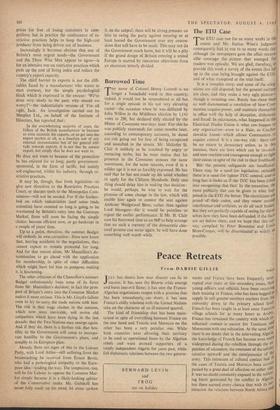Borrowed Time
Trr HE name of Colonel Henry Luttrell is no longer a household word in this, country; indeed, it would not be remembered at all but for a single episode in his not very elevating career—the occasion when he was, defeated by John Wilkes in the Middlesex election by 1,143 votes to 296, but declared duly elected by the Muse of Commons two' days later. Fix- thisthe was publicly execrated;. for some months later, according to contemporary accounts, he dared not risk going out for fear of being recognised and assaulted in the streets. Mr. Malcolm St. Clair is unlikely to be troubled by angry or menacing mobs; but he must realise that his presence in the Commons arouses the same resentment, for the same reasons, even if in a milder age it is not so forcibly expressed. He has said that he has not made up his mind whether to apply for the Chiltern Hundreds. Only one thing should delay him in making that decision: he would, perhaps, be wise to wait for the promise of some change in the law, which will enable him again to contest the seat against Anthony Wedgwood Benn, rather than against' Lord Stansgate—for it would be pointless to repeat the earlier performance. If Mr. St. Clair uses his borrowed time as an MP to help arrange that no such a travesty of the democratic elec- toral process can occur again, he will have done something well worth while.


































 Previous page
Previous page